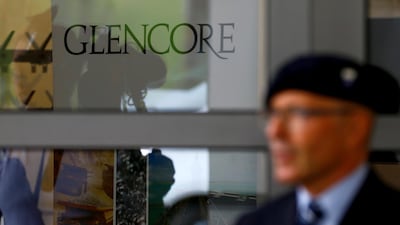Glencore tumbled the most in two years as its African troubles escalated dramatically after US authorities demanded documents relating to possible corruption and money laundering.
The world’s biggest commodity trader said Tuesday that it’s been subpoenaed by the US Department of Justice (DOJ) to produce documents with respect to compliance with the Foreign Corrupt Practices Act and United States money laundering statutes, Bloomberg reported.
The documents relate to the company’s business in Nigeria, the Democratic Republic of Congo (DRC) and Venezuela from 2007 to the present. The shares plunged as much as 11 per cent.
It’s been a tumultuous year for Glencore, mostly due to challenges linked to its business in the Congo, where it operates giant copper and cobalt mines. The Swiss company trader and miner is already facing the possibility of a bribery investigation by UK prosecutors over its work with Dan Gertler, a billionaire and close friend of Congo President Joseph Kabila, people familiar with the situation said in May.
Glencore said it is reviewing the subpoena and will provide further information in due course as appropriate.
The shares dropped to the lowest since July 2017 and were down 10 per cent in London morning trade.
“Given the flow of negative news we’ve had through the course of this year, the knee-jerk reaction is worse than it otherwise might have been,” said Hunter Hillcoat, an analyst at Investec Securities. “The DOJ fines can be big, but to wipe out 10 per cent of the market cap would be bigger than any fine I can recall.”
The company paid $308.1 million to the DRC in 2017, according to Glencore's report on payments to governments, according to Reuters.
It also paid $94.3 m to Nigeria for crude oil purchased from state-owned companies, according to the report.
_______________
Read more:
Glencore tests US sanctions reach with Gertler deal
Electric vehicle revolution in hands of African misfit
_______________
Last month, the company’s problems seemed to be easing as it headed off two of its biggest challenges in the DRC. Faced with the risk of losing control of its mines, Glencore bowed to the demands from two entities with close government ties - the state-run mining company Gecamines and Mr Gertler, who’s currently under US sanctions, according to Bloomberg.
Glencore’s bonds also slumped on the news. The company’s $583m of notes due April 2026 led the decline, falling 3 cents on the euro to 108 cents, the biggest drop in more than two years, according to data compiled by Bloomberg.
Separately, a court in the DRC on Monday suspended a hearing about a lawsuit brought by a former shareholder of a Glencore-owned cobalt and copper mine.
The case was put on hold pending a decision by the country’s Court of Appeal on whether the High Court should have jurisdiction over the case, Judge Roger Songambele said at the court in the capital, Kinshasa.
Congolese-American businessman Charles Brown, a founding shareholder of Glencore’s Mutanda Mining, has accused Glencore chief executive Ivan Glasenberg and two other people of arranging the fraudulent sale of his shares to the Swiss company and is demanding $1.14 billion in compensation and damages. The three men were ordered in March to appear at the hearing.
Mr Glasenberg, Aristotelis Mistakidis, head of Glencore’s copper-trading business, as well as former Mutanda shareholder Alex Hayssam Hamze, didn’t attend Monday’s hearing.
Glencore declined to comment on Monday.

